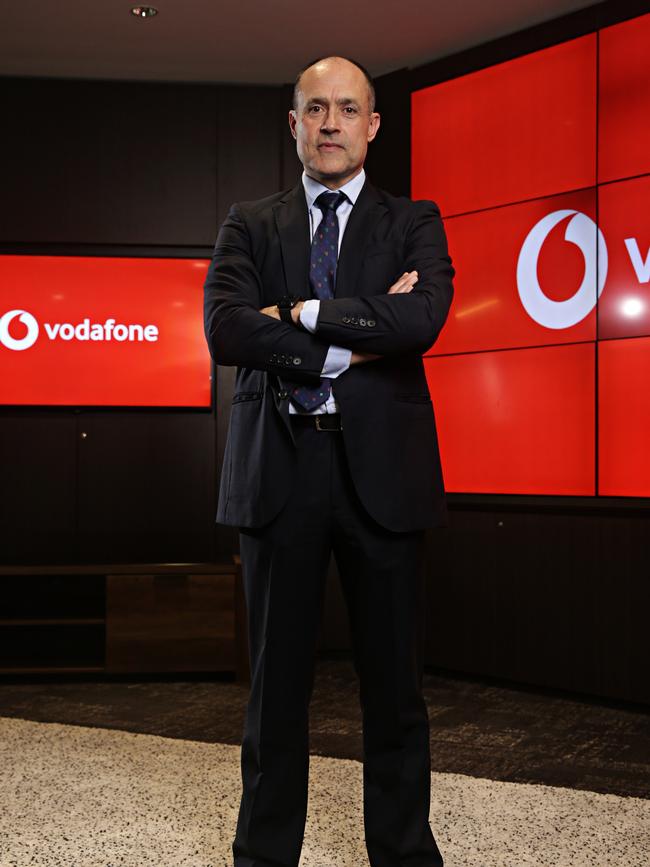Paying too much for mobile plans? Blame the government: TPG boss
The boss of Vodafone’s owner says NBN Co is a “900-pound gorilla” Australians are subsidising.

Australians are paying too much for internet and mobile plans, the boss of Vodafone owner TPG says, as he slams the high price of spectrum and the federal government’s plans to “tax everything that creates competition to the NBN”.
TPG chief executive Inaki Berroeta said Australians were paying $8 extra a month – or about 10 per cent the cost of a 50Mbps broadband plan – to subsidise NBN Co, a government-owned telco he branded a “900 pound gorilla”.
Mr Berroeta said the auction process for spectrum was also outdated, further driving up the price of mobile plans, costing telcos more than $10bn in the past decade, which was passed on to consumers. He also criticised the amount of red tape the government imposed on telcos, saying it was stifling innovation and fuelling inflation.
“Paying some of the world’s highest prices for spectrum is unsustainable and only ends up hurting consumers when costs are inevitably passed on,” he said.

“We recently did a stocktake of all the laws, regulations, codes, and standards TPG is subject to, and the results were shocking. Many of these are well-meaning and serve important functions – but just as many are outdated and impose unnecessary cost.”
Mr Berroeta was critical of plans to extend the Regional Broadband Scheme – a levy that the government introduced in 2020 to subsidise NBN Co that commercial telcos and their customers are forced to pay – to wireless networks.
TPG operates NBN competitor Vision Network, which it has sold to Macquarie and Aware Super-backed Vocus for $5.25bn so it can invest the proceeds in its mobile infrastructure. Mr Berroeta said Vision Network was “entirely overbuilt by NBN”, which owns more than 90 per cent of the fixed broadband market. “While we agree that the NBN plays a vital role in our industry, the regulations designed to protect NBN at the expense of competition are counter-productive,” he said.
“Not only does Vision compete with the 900-pound gorilla of the NBN, but it must also pay a tax in the form of the Regional Broadband Scheme. Let’s not beat around the bush here, the RBS is a tax designed to protect and subsidise the NBN’s business case.”
“This regulation decreases competition by making private marginal investments difficult, particularly to compete against NBN in regional areas. It is also a poor deal for most broadband consumers as it costs them $8 a month on their home internet bill.”
Mr Berroeta said NBN Co was “big enough to exist on its own merits”. But the government has argued that the Regional Broadband Scheme (RBS) levy is necessary, given NBN Co’s fixed wireless and satellite networks are “expensive” and “estimate to incur net losses of $12.9bn over the next 30 years”.
The Department of Infrastructure also says that the RBS “does not impose a new cost on NBN users’. “The cost of is already built into existing NBN pricing. Around 95 per cent of the cost of funding NBN Co’s fixed wireless and satellite networks continues to be paid for by NBN Co,” the department says.
“The remaining 5 per cent is being paid for by competing NBN-comparable fixed-line wholesale networks.”
The government is now planning to extend the RBS to wireless broadband services but Mr Berroeta said that must undergo “critical examination”.
“Taxing everything that creates competition to the NBN is not the answer, particularly as a significant number of wireless broadband customers are in regional areas. This is not a good outcome for our industry and certainly not for consumers”.
Mr Berroeta said the current spectrum auction process and policies also favoured Telstra and not its competitors.
“It is not just the high cost of spectrum that is hurting consumers and industry. It is the way spectrum costs are proportioned across the industry.
“Over a 15-year period, we have calculated that TPG spends about 11 per cent of its annual mobile revenue on spectrum, Optus spends about 6 per cent, and Telstra spends about 5 per cent. This disparity does not support challengers and competition; it entrenches the status quo.
“This ultimately hurts competition and applies a hand brake to those wanting to use their precious capital to do things differently, to enhance their networks and serve customers better.”
Mr Berroeta said TPG’s $1.6bn network deal with Optus would help end Telstra’s “bush tax” – Vodafone’s base mobile plan is 24 per cent cheaper than Telstra’s – but said more need to be done.
“We asked for open access to regional networks but that was not supported by the ACCC (Australian Competition and Consumer Commission), then through a commercial agreement with Telstra which was knocked back by the ACCC.
“Our preference is always to seek to share through private arrangements where the commercial construct can be agreed by the parties, such as we did with Telstra and then Optus.
“What we need from government and regulators is their support to promote and approve sharing of telecoms infrastructure to benefit Australians.”




To join the conversation, please log in. Don't have an account? Register
Join the conversation, you are commenting as Logout